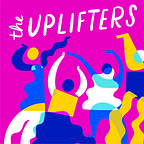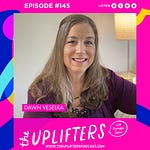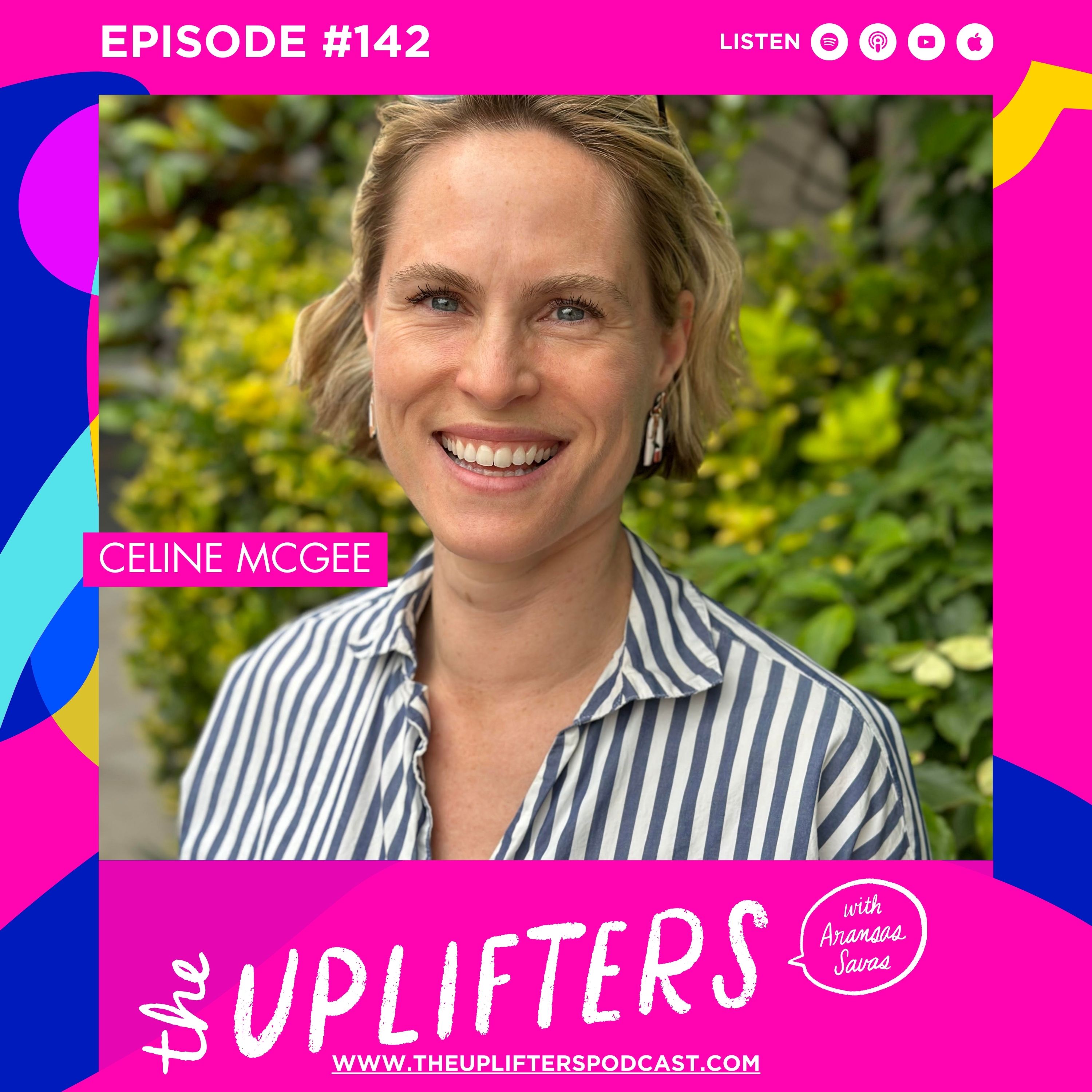Listen to our latest episode in the player here, on Apple Podcasts, Spotify, YouTube, or wherever you get your podcasts.
THIS WEEK ON THE UPLIFTERS
I’m so proud and grateful to welcome Lisa Halverstadt onto our show today. Lisa is a senior investigative reporter for Voice of San Diego, a nonprofit investigative outlet in San Diego. Lisa writes extensively about her community's homelessness, substance abuse, and behavioral health crises and the people impacted by them.
I met Lisa a couple of months ago when my brother-in-law died from the effects of substance abuse disease and homelessness. We all missed him terribly for the decade-plus that addiction created a distance we couldn’t quite bridge. When he died, we felt hungry for any piece of him that we could hold onto that would let us back into his life.
My daughter, in her own search for understanding the uncle that she'd never really gotten to know, stumbled across this article that had been written by Lisa. It gave us peace about something we really struggled to understand.
That’s what Lisa’s work does: it creates understanding and it bridges gaps. She creates greater awareness of the experience of homelessness, and its effects on individuals and families and in doing so rehumanizes these people who struggle daily just to stay alive.
We also discuss what it’s like to be an Uplifter doing this intensely emotional work, the challenges and surprise superpowers that made this job a perfect fit for her, and the Journalist Trauma Support Network that has helped her process the harsh realities she witnesses all too frequently.
It's easy to sit in our homes and feel like somehow we are different than people who are without them. But the truth is, we all have the same needs. Lisa uses her work to bring us back together. I can think of nothing more important or uplifting.
Lisa has graciously shared a list of resources that can help us think about other ways to help:
https://www.nytimes.com/2022/12/02/opinion/charity-holiday-gift-california-homelessness.html
https://www.latimes.com/california/story/2020-01-11/homeless-help-ways-housing
https://www.coalitionforthehomeless.org/what-should-i-do-if/
To hear more from Lisa click here. To learn more about the unhoused community on Lisa’s beat, read Uplifter Peggy Peattie’s Tales of the Street blog.
I hope you’ll listen deeply to this episode, share it, and find ways to reconnect to those in your community, who most need a friendly hand.
Let’s keep rising higher, together,
Aransas
MESSY TRANSCRIPT
Aransas Savas (00:02.194)
Welcome to the Uplifters Podcast. I'm your host, Aransas Savas, and I love every episode of this show and sort of fall in love with everyone of the women that we talk to who so courageously shares her story and her perspective. But.
Aransas Savas (00:28.866)
Today is especially special and in all honesty, it's the one in some ways that I've been the most nervous to record and to share. Because today we are welcoming Lisa Halvorshtad onto our show. And Lisa does some pretty heroic work. She is a senior investigative reporter for the voice of.
Aransas Savas (00:56.182)
San Diego, which is a nonprofit investigative outlet in San Diego, where she writes about her community's homelessness, substance abuse, and behavioral health crises and the people who are impacted by them. She's written about a lot of other really important subjects as well. But I met Lisa a couple months ago when my brother-in-law, Greg,
Aransas Savas (01:24.262)
died from the effects of substance abuse, disease, and homelessness. And while we lost him on that day, we had missed him terribly for over a decade because the drugs had gotten in between him and us as they do.
Aransas Savas (01:54.462)
And it was a distance that despite our best efforts, we couldn't bridge. And so we missed a lot of Greg's life.
Aransas Savas (02:07.402)
And when he died, it left us all feeling hungry for any piece of him that we could hold on to. That would let us know him in these last years, that would let us back into his life.
Aransas Savas (02:29.938)
My children felt really frustrated and angry that they hadn't gotten to know their uncle. And my resourceful daughter went on her own search for understanding for the uncle that she had missed. And in doing so stumbled across an article written not long before Greg's passing.
Aransas Savas (02:56.97)
about his life. Lisa's work, Lisa's writing gave us a sense of peace and understanding about something that we had really struggled to understand. And that frankly, we had no other way of understanding.
Aransas Savas (03:21.066)
But that's what Lisa's work does. It creates understanding, and it bridges gaps.
Aransas Savas (03:30.798)
Through her work, she helps people understand what it is to be homeless, the effects on individuals and families and communities. Her work has created policy changes that support these populations. And she's helped illuminate the truth of an experience by.
Aransas Savas (03:59.506)
rehumanizing what it is to be someone who struggles day after day just to stay alive. But as humans, our own quest to live and to keep going, it's really easy to create a distance between ourselves and those that are othered, those that feel different from us.
Aransas Savas (04:28.598)
And it's not out of any bad intention. But naturally we as humans can sit in our homes and feel like somehow we are different than people who don't have them. But the truth is we're just humans with the same goals and the same needs and the same hopes and the same dreams. And talking to Lisa has helped me better understand that.
Aransas Savas (04:58.154)
And so I wanted to introduce her to you, because I believe that her work has the power to bring us back together by using story and journalism. She helps us see a little more clearly.
Aransas Savas (05:19.05)
And I can think of nothing more uplifting than that. So please join me in welcoming Lisa Halvorsat to the Uplifters podcast.
Aransas Savas (05:31.938)
Lisa, thanks for being here.
Lisa Halverstadt (05:32.963)
Thank you so much for having me. And that was just a beautiful introduction. I'm so flattered by that.
Aransas Savas (05:41.298)
I'm so grateful. And Trudeform, I know you were up all night, last night working. So special thanks for joining us today. Maybe we just start by talking about your last 24 hours to better understand what it is you do and what goes into it.
Lisa Halverstadt (06:08.823)
Yes, so I have been in beast mode, I would say, the last week or so, because the city of San Diego has been considering an encampment ban, which would impact folks who camp on the street. I won't get into all the nuances of that, but I've been writing a lot about various angles of this. And last night, a Tuesday night, the city council voted on this ordinance and voted to approve it.
Lisa Halverstadt (06:38.287)
There were more than four hours of public comments. Actually, one of the neat moments last night was that I had written about a guy who struggled to get shelter. He actually went to this place called the Homelessness Response Center to try to get shelter. And on the 11th day, he finally got it. And he was invited to come and speak to the city council about that after I highlighted his story. But ultimately,
Lisa Halverstadt (07:07.055)
There were lots of deliberations. It was a pretty tense meeting. I was in touch with my editor throughout the night and ended up working till probably, I guess I was done maybe around 11.30 or something last night and things were still hitting my inbox after that. So it was a long night, but it's important.
Lisa Halverstadt (07:34.007)
You know, journalists really take this role seriously to tell you what's happening, including when it happens in inconvenient times, but also just to provide context throughout and be prepared to cover every angle of something like this that's very complex.
Aransas Savas (09:01.042)
What drew you to journalism in general, Lisa?
Lisa Halverstadt (09:05.655)
Well, I think it found me before I found it. I had teachers that recognized this in me before I saw it. I was always really curious. I would pick different topics that I was interested in. I loved to go to the library, and I would just read a stack of books. I mean, everything from the John F. Kennedy assassination to dermatology. So quite a range. And I also love to write.
Lisa Halverstadt (09:34.795)
I love to talk to people about what I learned. And so it just was very natural. So I had some teachers who said, you should work for the student paper, Lisa, you know, because it just seemed really obvious to them, I think. So like I said, it found me.
Aransas Savas (09:55.355)
And then what drew you to this type of journalism and this particular focus?
Lisa Halverstadt (10:03.023)
So years ago, from a practical standpoint, my news outlet was looking at beads and we were just watching as the homelessness crisis was getting worse in San Diego as it has been in a lot of other communities as well. And we just thought, you know, there are a lot of stories that are talking about like this, you know, nonprofit has a new shelter they're opening up or here's this new initiative, but there wasn't a lot of accountability reporting that looked at like.
Lisa Halverstadt (10:30.959)
What are we doing collectively? Who's in charge here? And who's, you know, are we making a dent in this? Cause it doesn't really look like we're making a significant dent in this. So what's going on? So from a practical standpoint, that's how I got into it. But looking back, I mean, there are certain things that make it such a good fit and make me more passionate about this. You know, I really identify with people that are underestimated and who...
Lisa Halverstadt (11:00.963)
don't feel like they have a voice. In some ways, I grew up feeling that way. I have ADHD, which not a huge deal, right? And this day and age, but at the time that I was diagnosed, less was known about this. And so, I had a doctor that kind of made my parents a little scared about what might be my prospects for future success. And at one point I had a teacher that told my parents that I was an idiot.
Aransas Savas (11:30.872)
Mm.
Lisa Halverstadt (11:30.887)
and I found out about it. And so that was difficult, but in that moment, I still remember being a third grader with crazy hair and my big Coke bottle glasses just saying, no one is ever going to call me an idiot again. And I think back about that sometimes because I...
Lisa Halverstadt (11:55.179)
You know, obviously I'm an objective journalist. You know, I go hard after everything and everyone to get answers, but I do understand what it means to be underestimated. And so there's a certain understanding in that, that maybe somebody doesn't look like they have that much to offer, you know, to the outside world. But in fact, they do have a lot to offer. And also kind of from a just a sort of silly thing that I n ever thought about is I do not have a sense of smell.
Lisa Halverstadt (12:26.439)
I was born without one as far as I know. And this has actually been a superpower for me on the street because I'm able to sit with people and I don't smell them, I see them. And it has turned out to be something that I hated for so many years that actually makes me better at my job.
Aransas Savas (15:19.532)
So what do you see that close up, Lisa?
Lisa Halverstadt (15:24.915)
Oh boy, a lot. I do see a lot of effort to create community and support that a lot of people don't see. I see a lot of caregivers, people caring for other people on the street, whether that's in the form of literally changing their diapers. I'm not exaggerating or, you know, helping to watch someone's stuff while they go to that important appointment.
Lisa Halverstadt (15:53.815)
or the word that gets spread on the street, or also how the community, especially with this fentanyl crisis we're in, that are literally saving each other's lives in a lot of cases and bearing witness to a lot of really scary stuff. But it's also just really hard out there. And I think often it's easy for those of us that have a place that every day we can go and we can leave our stuff when we go to work. We can have a routine because we have a place. We can count on, you know, easily getting a shower or to use the restroom or to get a meal. This isn't something that people who live on the street can necessarily count on. They, you know,
Lisa Halverstadt (16:53.239)
having to be concerned about moving to different areas, whether that's because of police enforcement, or maybe there's someone on the street that's threatening them and they need to move to another place. Or sometimes I hear about, oh, there was a group that came down and brought food today, and then another group and another group, but then for the next two days, there wasn't anyone coming. So what do we do during that time?
Lisa Halverstadt (17:22.639)
And people really struggle with restroom and shower access. I know a lot of people who stay in areas specifically because there is some restroom or shower access. And just imagine, often people will say, get a job. Well, everybody wants to take a shower before they go to their job. Imagine if you had to get in line early enough that you can get your shower to then go to work
Lisa Halverstadt (17:51.971)
the line might be snaking around a particular area. And the showers aren't necessarily, sometimes people are relying even on vans that drive around that have showers in them essentially, and those might not be available every day. Sometimes it's only one or two days a week that the shower van pulls up. So there are just a lot of challenges that I think can be really hard for people that just are able to come home every day to.
Lisa Halverstadt (18:22.2)
really understand.
Aransas Savas (18:24.898)
what do you see as the effects of these basic human needs being unmet for these people?
Lisa Halverstadt (18:50.315)
I mean, it's very traumatic. People do feel just completely downtrodden. And one thing I wanted to make sure to say today too, is that, you know, so often people look past homeless people. They look away from them and homeless people feel that. They feel it. And, you know, one of my...
Lisa Halverstadt (19:17.299)
My uplifters in my life, Peggy Petey is an excellent photo journalist who I've had the opportunity to work with the last year or so. And she has a blog called Tales of the Street. And she interviewed this guy named Moses recently. And he talked about how when he lived on the street, he would often feel like, okay,
Lisa Halverstadt (19:44.279)
you know, I can't take this anymore. Maybe it's time to end this. And people would walk past, you know, and he would feel that judgment. But every once in a while when he felt like that, someone would look at him, acknowledge, smile at him, and it would turn it around. He would keep going. And I think it's so important to reflect on that, how much when people are, you know, sort of rejected
Lisa Halverstadt (20:15.111)
whether that's overt or not, that we as humans feel that. And that actually is part of the hierarchy of needs is feeling that connection. And so, I think many of us think that we can't do anything about homelessness. It's just this horrible, systemic, intractable issue. But what I often tell people is, you can smile at someone and say hi.
Lisa Halverstadt (20:44.895)
and it might have more of an impact than you think.
Aransas Savas (20:48.674)
I've done it. I've walked past people. I've averted my eyes. I have...
Aransas Savas (21:17.054)
It's, we act as though it's catching.
Aransas Savas (21:22.334)
And there is a lot of violence. And I live in New York City where we've had an increase in violence, committed by unhoused people. Or at least a lot more reporting on it, depending on who you talk to about whether, about which numbers to look at. And so now I do feel a greater sense of fear than I used to about looking people in the eye because it...
Aransas Savas (21:52.498)
I worry for myself and my children that it will be a provocation. But I also think that we have an intuition that can guide us about what is a dangerous situation and what is not. We know when somebody is volatile and somebody's on the edge. And we know when somebody is just living their life and might benefit from...
Aransas Savas (22:20.906)
a kind eye or, sorry, a kind eye because that sounds.
Aransas Savas (22:28.51)
It sounds like some sort of saviorism, but it's really just acknowledging that we are human beings in the same way that I would pass the lady with the stroller and the fancy shoes.
Lisa Halverstadt (22:41.419)
And sometimes it's as quick as just a nod to just acknowledge, Hey, I see you. Just like if you were walking past your neighbor on the street. And I think, you know, to your point too, I mean, I do have to use my gut. A lot of times there are some people that are not ready to talk to me today. Um, and so, you know, I may not engage with them, but there are a lot of people. Um, I think just people would be so surprised how much a lot of unhoused people want connection.
Aransas Savas (22:44.748)
Mm-hmm.
Aransas Savas (23:13.526)
By saying that, I think you helped bridge that gap between us and them.
Aransas Savas (23:24.938)
It's the simplest thing. And I also hear in your story how hard these people are working. Because I think part of the way that we create distance is a sense of a perception of laziness or resignation and surrender.
Aransas Savas (23:52.862)
And when I listen to you, I hear you say, well, of course they feel resigned. And of course there is some surrendering because every single human need has to be fought for so hard. How exhausting that must be.
What has surprised you most in getting to know people who are unhoused?
Aransas Savas (24:39.919)
and in many cases, addicted.
Lisa Halverstadt (24:43.471)
how many people are just good people, just like the rest of us. in any group of people, there are nice people and there are not so nice people, that's in any group. I just encounter a lot of people that are so kind and especially when they find out what I do and that I want to tell their stories, they are lining up other people to talk to me.
Lisa Halverstadt (25:13.027)
they want to help, oh, let me tell you about this thing. Or sometimes even when I will show up somewhere and people can tell that I'm a reporter, they'll try to come be closer to me, to talk to me when the other person's done or say, hey, I've got a story, I've got a story. So, I think like many people before I wrote about this topic, I had a lot of preconceived notions about the homeless population.
Lisa Halverstadt (25:42.335)
And I had a sense that people were gruff and mean and, you know, maybe scary. Um, but what I found is most people are, you know, pretty good people. Um, they have their flaws like any of us. Um, but a lot of good people are out there struggling.
Aransas Savas (28:08.3)
What do you believe needs to be done to make things better for these people? I know. I know.
Lisa Halverstadt (28:16.779)
That's a big question. That is a big question. As a journalist, I can't really have opinions about what the best solutions are other than to report on what data tells us. I think one thing that is obvious is the word homeless. It indicates that they don't have a home. And so housing that is affordable.
Aransas Savas (28:29.666)
Mm-hmm.
Aransas Savas (28:37.414)
Mm-hmm.
Lisa Halverstadt (28:46.663)
and that people can efficiently get into, or that when somebody is falling, when somebody's struggling, that we have a system that can kind of hurry up and put its arms out and support them is really crucial to solving this problem. You need a homeless service system that is both able to prevent people from falling into homelessness.
Lisa Halverstadt (29:12.407)
And then when they do able to efficiently help them get out of homelessness. Um, and that's a struggle in communities across the country, including San Diego right now, because so many more people are falling into homelessness. Um, they're moving into shelters and then there's not housing available at the end. Um, and so people sort of get stuck. Um, I also just think in general that, um, you know, again, I can't have, uh, beliefs about.
Aransas Savas (29:26.338)
Mm.
Lisa Halverstadt (29:41.695)
solutions or other things. But one thing that I just refuse to ever lose sight of is that we are talking about people. We are not talking about pests. You know, we're talking about fellow community members. And I think it's really important to keep that in mind when we think about solutions. And the thing about community members is that
Lisa Halverstadt (30:07.691)
A community can have a lot of different types of people in it with different opinions and experiences, but they're still our community members.
Aransas Savas (30:18.706)
Yeah. And community members in many cases who are sick.
Aransas Savas (30:26.562)
who are struggling with disease as a result of homelessness or addiction or mental illness that led to the homelessness. Lisa Halverstadt (31:18.079)
a lot of people actually have more mental health and substance abuse challenges once they end up on the street. So I have met so many people who started using on the street. I'll give an example, Julie, a woman that I've been keeping in close touch with, she was a meth user and an alcoholic. And she is now
Aransas Savas (31:29.848)
Mmm.
Lisa Halverstadt (31:47.127)
hopefully moving into housing pretty soon here. She's come a really long way. But she, like many homeless women, shared with me that she started using meth to stay awake at night because she was scared of being assaulted. And so this was sort of a coping mechanism for a tough situation that she was in as a vulnerable woman on the street. A lot of people get PTSD.
Lisa Halverstadt (32:14.955)
living on the street. Just imagine all that uncertainty and sounds and just constantly being worried that somebody's going to attack you or something's going to happen to you. People get deeply depressed on the street. People, you know, may have some mental health issue that's relatively minor, like many of us might deal with anxiety or something. But that gets exacerbated on the street.
Lisa Halverstadt (32:44.899)
Just the daily trauma of it is just so much more than what most of us who are housed experience.
Aransas Savas (32:52.334)
and the level of support. So if I have an anxious day, I can go into my cozy bed and take a nap or walk into my nice warm shower and take a shower or go to my doctor and receive care using my powerful insurance. And I think what you're pointing to is that these people don't have access.
Aransas Savas (33:23.28)
to these available fixes and so they turn to the fix that's available.
Lisa Halverstadt (42:33.995)
And so often it just it hits me because I'll talk to somebody and they'll say you're the first person that talked to me today Thank you for listening I have people that the first time we meet they're hugging me Because no one's seen them that day no one's seen them maybe even that week
Aransas Savas (42:55.454)
Yeah, and if those of us who have access to warm beds and hot showers feel like we are desperate to be seen and known and understood, how intense that must feel when even your most basic needs are not regularly being met.
you see so much hardship every day.
Aransas Savas (03:44.614)
How do you take care of yourself to sustain this work that you do?
Lisa Halverstadt (03:53.471)
So for years, I've had different self-care tactics, listening to music as one, talking to my friends. But I'll be honest that there was a time earlier this year I realized I was kind of at a turning point where if you wanna think about life as a cup of water, but that water is trauma.
Lisa Halverstadt (04:19.271)
The goal for me is always to keep, because I'm talking to so many people that are in the trauma cycle, I'm seeing a lot of things, is to just keep that cup from overflowing, keep it manageable. And I usually have been able to do that, but I worked on a really tough story that really hit me hard personally. And that led me to start going to Therapy Weekly. I'm in a program for journalists with the DART Center, great resource for folks to check out.
Lisa Halverstadt (04:50.475)
And that has been so uplifting for me. And really what that's about is I, you know, I wasn't deeply depressed or anything, but just to have a space to put my own feelings about the things I was seeing. Because what I realized is, as much as I had great friends and family that wanted to support me, and of course my editors who were supportive, you know, I was constantly just taking in other people's emotions and traumas. And...
Lisa Halverstadt (05:17.227)
I just needed to create a specific space where I could kind of talk about how I felt about something so that I could just run back out there. And I think, you know, I debated if you asked this, if I was going to say this, but I think it's important that we need to create space to talk about how we feel about things. And that helps make us better for other people.
Aransas Savas (05:43.618)
I agree. It's essential. And we have to normalize healing the healers and caring for the caregivers. And so much more can happen when our cups are not empty. It is enabling and sustaining. Thank you so much for sharing that.
Aransas Savas (44:07.854)
We have been ending each episode of this show with a moment of reflection to ground the insights and ideas that we've heard. And so in this moment, I just wanna invite those of you listening to just take a quiet moment with yourself.
Aransas Savas (44:38.854)
to get curious about what this conversation might mean for you moving forward.
Aransas Savas (45:01.066)
My dog is very excited in the background. It means a lot to him apparently to get attention, to feel seen and heard in this moment.
Lisa Halverstadt (45:03.727)
Hehehe.
Lisa Halverstadt (45:10.568)
A lot of unsheltered people have dogs. I had a lot of dogs over the years. Some very cute ones.
Aransas Savas (45:17.866)
Yeah, that is, it's always interesting to me to see the love between dog owners and dogs on the street and to imagine the roles that those dogs play. That of, I assume, protector and confidant and comfort.
Aransas Savas (45:40.469)
and
Lisa Halverstadt (45:40.727)
Absolutely, I think a lot of times people will judge why does this person have a dog, or why does this person stay in a tent? And there's often a complex answer to that question that can be really hard for those of us who are housed to contemplate. Maybe going into a shelter means not having that dog, which is your best friend in the entire world.
Lisa Halverstadt (46:09.803)
and your reason for being. Or maybe there are folks out on the street that I've met who have caregivers out on the street. And those caregivers, maybe it's a boyfriend and a girlfriend. And if they were to go into a shelter, they couldn't share the same bed when someone literally has cancer or epilepsy and needs that sort of around-the-clock monitoring and support. Or maybe they've had a
Lisa Halverstadt (46:39.907)
challenges in shelters before maybe they're a person that has PTSD and so the idea of being in a shelter that is just packed with people is just terrifying and I think a lot of us who are housed might acknowledge to ourselves like I actually would not like to go stay in a shelter. I am a light sleeper and if I stayed in a shelter I would never sleep because somebody would always be snoring.
Lisa Halverstadt (47:07.395)
You know, somebody's always getting up and moving in the middle of the night. So I think it's important to think about, there's often context, just like our housed friends' lives. You don't understand why did somebody take that job or, oh my God, why is she dating that person? But there's a story from their perspective as to why they're doing this. And that's something too, even on, you know, totally separate from homelessness related reporting and my investigative reporting, I'm constantly thinking about.
Lisa Halverstadt (47:37.323)
why is this person doing what they're doing? There is a reason that they're doing this. And often that reason is, you know, and kind of that process is a way to understand. And sometimes it's a way to understand why something unsavory is happening, but it can be really insightful to take a step back and put ourselves in that other person's shoes and realize maybe this is, I'm not seeing every aspect of this.
Aransas Savas (48:06.494)
And as humans, we think we do. We think we know more than we ever could. And we make leaps and generalizations for all sorts of reasons for our own psychological safety. And if I were to take only one thing for this important and...
Aransas Savas (48:32.634)
really, truly insightful and inspiring conversation. It would be to just give ourselves the gift of seeing our communities more fully.
Aransas Savas (48:51.138)
Thank you, Lisa. Thank you for your work. Thank you for what you've done for our family.
Lisa Halverstadt (48:53.455)
Thank you.
Aransas Savas (49:31.234)
For those of you listening, please head over to theuplifterspodcast.com. I will share links to the organizations and pages that Lisa mentioned, and we'll hopefully be able to source from her some other recommendations for ways that we can keep learning and growing and rising together.
END OF EPISODE
END OF VIDEO 1
Aransas Savas (00:01.198)
So Lisa, tell us about someone who inspires you. And if you will, just begin by saying, this is Lisa Halverstadt, and this is, I can't even talk now. The way I usually do them is, hi, uplifters. My name is Lisa Halverstadt, and someone who inspires me or an uplifter who inspires me is something.
Lisa Halverstadt (00:16.262)
Yeah
Lisa Halverstadt (00:27.387)
Hi, I'm Lisa Halperstadt and an uplifter who inspires me is Vanita Hawthorne-James, who was one of my early editors at a former news outlet, the Arizona Republic. And Vanita is a trailblazer. She is a teacher. And I quickly will tell the story that I think says so much about her. She gave me my first stretch assignment.
Lisa Halverstadt (00:54.295)
And it was actually covering the ownership of a hockey team, if you can even imagine that. And I was so, oh my God, how am I going to do this? I know nothing about this. And Vanita said to me that, yes, you don't know much about this right now, but you are motivated now to figure it out. And I know that you will.
Lisa Halverstadt (01:20.211)
And that advice that I got from her on top of many other, you know, excellent pieces of advice and support I got from her over the years just sticks in my mind now every time that I get a challenge, whether that's work or otherwise, that I have a challenge, I don't know about it now, now I'm motivated to figure it out, and I will. And I hope that your listeners get a chance.
Lisa Halverstadt (01:48.947)
to meet Vanita Hawthorne James. She has an excellent story to tell and she is the ultimate uplifter. She has uplifted many other journalists. I'm just one of many.
Aransas Savas (01:59.306)
I can't wait to meet her. So a quick lightning round. What's one quick way you raise your own energy?
Lisa Halverstadt (02:10.239)
I listen to a song and I often sing along.
Aransas Savas (02:17.706)
What's one easy way you boost other women?
Lisa Halverstadt (02:23.023)
I try to see them and to make emotions that we have as women okay. I think a lot of times as women, we aren't really given the permission to hold space for our feelings. We might be angry. And so sometimes I will try to say, I see that anger or I see that really awesome moment that just happened.
Lisa Halverstadt (02:50.919)
I think that's really important because a lot of times, you know, again, we don't feel seen for our emotions or sometimes even for our wins by other people.
Aransas Savas (03:05.102)
And what's one little way you elevate your community, the planet, or the world?
Lisa Halverstadt (03:10.943)
Can we redo that one part? I could barely hear you for some reason. I think it might be my headphones were popping out. That's what was going on.
Aransas Savas (03:13.65)
Yeah. Oh, sorry. Okay. No worries. What's one little way you elevate your community, the planet or the world?
Lisa Halverstadt (03:24.219)
Oh boy, I share stories.
Aransas Savas (03:31.734)
And there was one question I really wanted to ask you that I forgot to ask, which is, you see so much hardship every day.
Aransas Savas (03:44.614)
How do you take care of yourself to sustain this work that you do?
Lisa Halverstadt (03:53.471)
So for years, I've had different self-care tactics, listening to music as one, talking to my friends. But I'll be honest that there was a time earlier this year I realized I was kind of at a turning point where if you wanna think about life as a cup of water, but that water is trauma.
Lisa Halverstadt (04:19.271)
The goal for me is always to keep, because I'm talking to so many people that are in the trauma cycle, I'm seeing a lot of things, is to just keep that cup from overflowing, keep it manageable. And I usually have been able to do that, but I worked on a really tough story that really hit me hard personally. And that led me to start going to Therapy Weekly. I'm in a program for journalists with the DART Center, great resource for folks to check out.
Lisa Halverstadt (04:50.475)
And that has been so uplifting for me. And really what that's about is I, you know, I wasn't deeply depressed or anything, but just to have a space to put my own feelings about the things I was seeing. Because what I realized is, as much as I had great friends and family that wanted to support me, and of course my editors who were supportive, you know, I was constantly just taking in other people's emotions and traumas. And...
Lisa Halverstadt (05:17.227)
I just needed to create a specific space where I could kind of talk about how I felt about something so that I could just run back out there. And I think, you know, I debated if you asked this, if I was going to say this, but I think it's important that we need to create space to talk about how we feel about things. And that helps make us better for other people.
Aransas Savas (05:43.618)
I agree. It's essential. And we have to normalize healing the healers and caring for the caregivers. And so much more can happen when our cups are not empty. It is enabling and sustaining. Thank you so much for sharing that.
Lisa Halverstadt (05:59.348)
Exactly.















